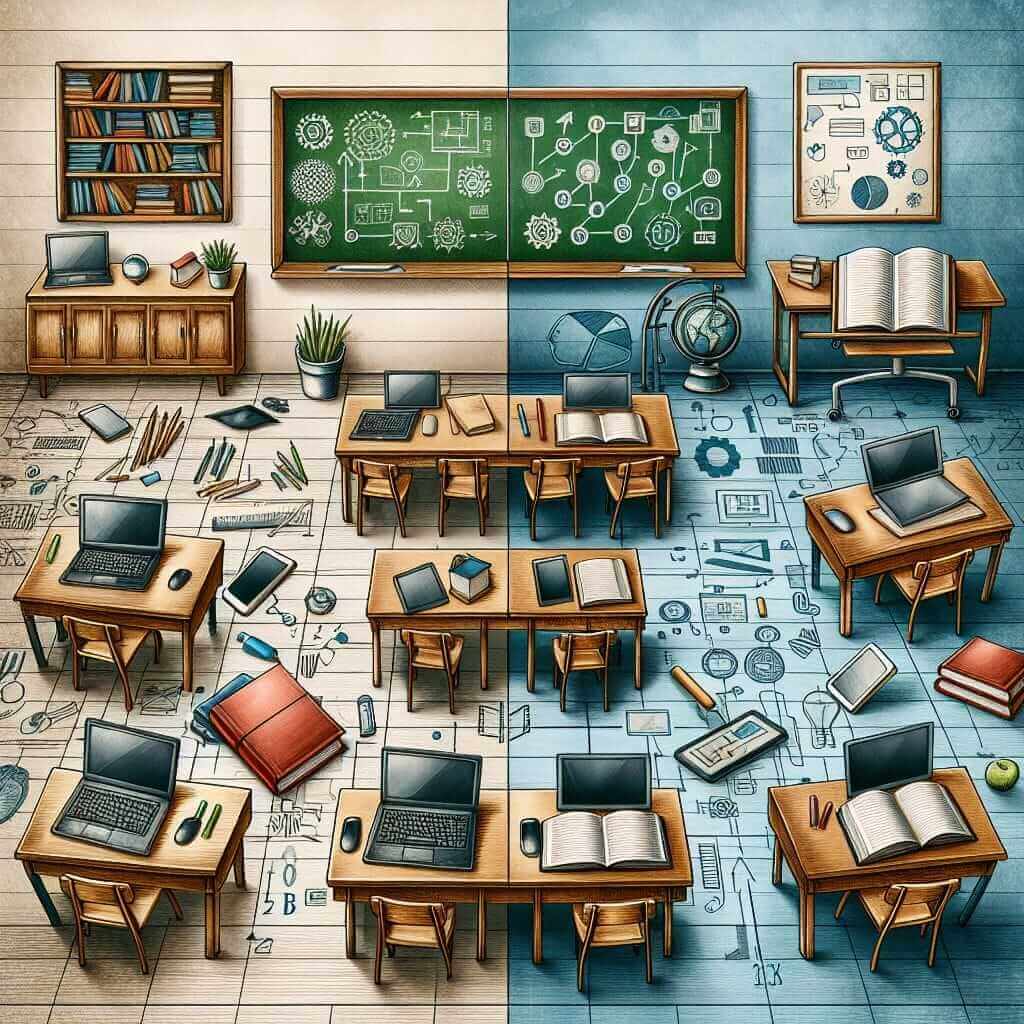The Reading section in the IELTS exam requires candidates to read passages and answer various types of questions to demonstrate their reading comprehension skills. One trending topic that reflects both modernity and relevance is the impact of digital transformation on traditional education. Over the years, this subject has gained prominence due to the significant shifts and challenges faced in the education sector.
Given the persistent nature of digital evolutions and its profound impact on various facets of life, it is plausible that future IELTS exams could include texts related to this topic. This exercise not only helps you practice reading but also familiarizes you with a current and critical theme.
Reading Passage: What are the Effects of Digital Transformation on Traditional Education? (Medium Text)
Digital transformation refers to the integration of digital technology into all areas of a business or sector, fundamentally changing how they operate and deliver value to customers. In the realm of education, this transformation has sparked both opportunities and challenges, reshaping traditional educational paradigms.
Traditional education, characterized by brick-and-mortar classrooms and face-to-face instruction, has been the cornerstone of learning for centuries. However, the advent of digital tools like online courses, virtual classrooms, e-books, and educational apps has revolutionized the field. These digital innovations enable flexible learning schedules, personalized instruction, and global access to education.
One of the significant benefits of digital transformation in education is the democratization of learning. Students from remote and underprivileged areas now have access to high-quality educational resources that were previously out of reach. Massive Open Online Courses (MOOCs) and platforms like Coursera and Khan Academy have made it possible for anyone with internet access to learn from the world’s leading universities and educators.
However, this sweeping change is not without its drawbacks. The digital divide—that is, the gap between those who have access to technology and those who do not—remains a formidable barrier. Students in lower-income regions may struggle with inconsistent internet access and a lack of devices necessary for online learning. Additionally, the lack of physical interaction in digital learning environments can hamper the development of social skills, which are crucial for personal and professional growth.
Moreover, the hastened shift to digital education during the COVID-19 pandemic uncovered infrastructure and pedagogical inadequacies. Many educators were unprepared for the sudden transition to online teaching, and curricula not designed for digital formats posed significant challenges.
Yet, despite the challenges, the potential for digital transformation to enhance traditional education is undeniable. Blended learning models, which combine online digital media with traditional face-to-face methods, are increasingly being adopted. These models cater to diverse learning styles and needs, enabling more effective and engaging educational experiences.
In conclusion, while digital transformation in education presents both opportunities and obstacles, its impact on traditional education is profound and far-reaching. Balancing the benefits of digital tools with the limitations will be crucial in shaping the future of education.
Questions
Multiple Choice
-
What is one benefit of digital transformation in education?
a. Increased cost of education
b. Limited access to education
c. Democratization of learning
d. Decreased quality of education -
What is a significant challenge mentioned in the passage regarding digital transformation?
a. Over-reliance on face-to-face instruction
b. Lack of high-quality educators
c. Limited access to physical classrooms
d. The digital divide
Identifying Information (True/False/Not Given)
-
The passage states that all students now have equal access to digital education.
a. True
b. False
c. Not Given -
Blended learning models are becoming more common in educational institutions.
a. True
b. False
c. Not Given
Sentence Completion
-
One of the platforms mentioned that offers online education is _____.
-
The shift to digital education during the COVID-19 pandemic highlighted the _____ of educational systems.
Answer Keys
- c. Democratization of learning
- d. The digital divide
- b. False
- a. True
- Coursera
- inadequacies
Common Mistakes
Neglecting Content Specificity: Many students fail to grasp the details specific to each question, leading to inaccurate answers. Always refer back to the passage to verify information.
Ignoring Contextual Cues: Understanding the context in which a statement is made can significantly affect your interpretation of the passage. Take note of surrounding sentences to get a clearer picture.
Vocabulary
- Democratization (noun): /dɪˌmɒkrətɪˈzeɪʃən/ – The action of making something accessible to everyone.
- Pedagogical (adjective): /ˌpedəˈɡɒdʒɪkəl/ – Relating to teaching methods.
- Infrastructure (noun): /ˈɪnfrəstrʌktʃər/ – The basic physical and organizational structures and facilities needed for the operation of a society or enterprise.
- Blended Learning (noun): /ˈblendɪd lɜrnɪŋ/ – An education program that combines online digital media with traditional classroom methods.
Grammar Point
Relative Clauses: These are clauses that begin with a relative pronoun like “who,” “which,” or “that,” and they provide essential or additional information about the noun they follow.
- Example: “Students from remote and underprivileged areas who now have access to high-quality educational resources.”
- Structure: Relative pronoun + subject + verb
Recommendations for IELTS Reading
- Time Management: Allocate your time wisely across the three sections. Typically, 20 minutes per section is advised.
- Skimming and Scanning: Quickly move through the text to get the gist and locate specific information.
- Practice Regularly: Regular practice with a variety of texts will help you become familiar with the different types of questions and improve your reading speed and comprehension.

Consistent practice with passages like the one above will enhance your reading skills and prepare you effectively for the IELTS Reading section. Good luck!